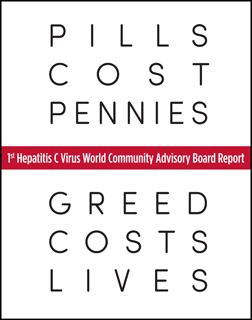PILLS COST PENNIES,
GREED COSTS LIVES
July 14, 2014
By Odilon Couzin and Karyn Kaplan
About the Hepatitis C Virus World Community Advisory Board
Since the early years of the AIDS epidemic, people living with HIV/AIDS and their allies have organized their communities and met with drug companies, researchers, and government regulators to influence clinical trials design, policy, drug pricing, and access to treatment. The HIV World Community Advisory Board—formed by the International Treatment Preparedness Coalition—has held national, regional, and global meetings with originator and generic pharmaceutical companies since 2004. It played an instrumental role in the availability of affordable generic drugs, enabling the global scale-up of HIV treatment in developing countries.
The hepatitis C virus (HCV) World Community Advisory Board (CAB) grew from an international AIDS activist movement. The objectives of the meeting were threefold:
- To provide a forum for leading activists to learn about developments in HCV treatment and access barriers;
- To find common advocacy strategies; and
- To meet with pharmaceutical companies about their plans for low- and middle-income countries (LMICs).
The HCV World CAB included a broad range of activists, including people with HCV, people who inject drugs, people living with HIV/AIDS, representatives from nongovernmental organizations and regional and global advocacy networks, and clinicians and researchers.
The 1st HCV World CAB met in Bangkok, Thailand, February 22–25, 2014. During the meeting, 38 activists from 22 countries held the first global LMIC-focused dialogue with pharmaceutical companies that produce HCV treatment. The meeting was co-organized by Treatment Action Group and the Asia Pacific Network of People Living with HIV/AIDS. The HCV World CAB was supported by AIDS Fonds, the Global Network of People Living with HIV, Médecins du Monde, Open Society Foundations, and the World Health Organization.
Participants spent the initial two days conducting peer-led trainings on:
- Clinical developments in HCV treatment and diagnostics;
- Intellectual property (IP) barriers to access to essential medicines;
- Structural barriers to access in LMICs; and
- Issues facing key affected populations, in particular PWID and men who have sex with men (MSM).
Participant Consensus on Access Issues and Strategies
Participants came from a wide range of countries and experiences, but shared a common goal. They gathered to advocate for universal access to the highest quality diagnostics, care, and treatment for HCV—regardless of income, geographic location, drug use, or HIV status.
They agreed that countries have the right to pursue the full range of strategies for securing access to affordable, quality HCV DAAs, and peginterferon (PEG-IFN).

